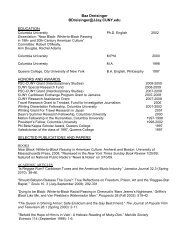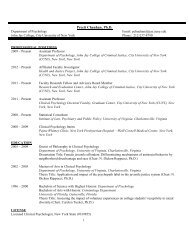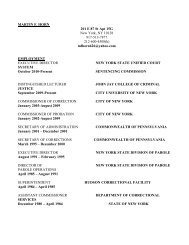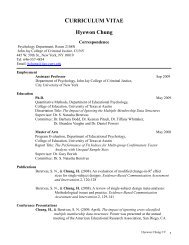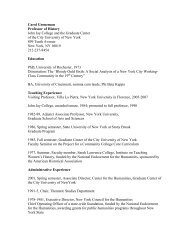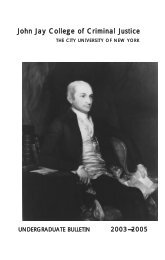Bulletin - John Jay College Of Criminal Justice - CUNY
Bulletin - John Jay College Of Criminal Justice - CUNY
Bulletin - John Jay College Of Criminal Justice - CUNY
Create successful ePaper yourself
Turn your PDF publications into a flip-book with our unique Google optimized e-Paper software.
Courses <strong>Of</strong>fered<br />
LIT 374 Topics in Nineteenth-Century Literature<br />
3 hours, 3 credits<br />
Topics in Nineteenth-Century Literature may focus on a literary<br />
genre or convention (e.g., lyric or narrative poetry, realist, romantic<br />
or naturalistic novels) or an important theme (e.g., industrialization,<br />
slavery, imperialism, and the romantic imagination) as a means of<br />
understanding the literature of the period. Each semester individual<br />
instructors will anchor the course in specific sub-topics, primary<br />
texts, cultures, historical moments, etc., depending on their own areas<br />
of specialization. The course will approach the canon for this period<br />
not as a fixed entity but as a body of work consistently open to<br />
reevaluation and critique; alternative texts, voices, and subject<br />
positions relevant to the topic(s) will be included. Topics in<br />
Nineteenth-Century Literature will examine select major and minor<br />
literary movements, authors, and ideas at work in 19th-century<br />
literature with an eye to the formal features of texts as well as the<br />
social, historical, and political contexts in which they appear.<br />
Prerequisite: ENG 102 or 201. Prerequisite or co-requisite: LIT 260<br />
or permission of the instructor<br />
LIT 375 Topics in Twentieth-Century Literature<br />
3 hours, 3 credits<br />
Topics in Twentieth-Century Literature may focus on a literary genre or<br />
convention (e.g., confessional poetry, non-linear narrative) or an<br />
important theme (e.g., alienation, memory and trauma, dominant vs.<br />
minority culture) as a means of understanding the literature of the period.<br />
Each semester individual instructors will anchor the course in specific<br />
sub-topics, primary texts, cultures, historical moments, etc., depending on<br />
their own areas of specialization. The course will approach the canon for<br />
this period not as a fixed entity but as a body of work consistently open to<br />
reevaluation and critique; alternative texts, voices, and subject positions<br />
relevant to the topic will be included. Topics in Twentieth-Century<br />
Literature will examine select literary movements, authors, and ideas with<br />
an eye to the formal features of texts as well as the social, historical, and<br />
political contexts in which they appear.<br />
Prerequisite: ENG 102 or 201. Prerequisite or co-requisite: LIT 260<br />
or permission of the instructor<br />
LIT 390 Individual Reading<br />
3 credits, 3 hours<br />
Submission of a project of reading and research for approval by the<br />
instructor. A paper and periodic conferences are required. Special<br />
arrangements may be made to do this work over the summer.<br />
Prerequisites: ENG 102 or ENG 201, and junior standing or above<br />
LIT 400 Senior Seminar in Literature<br />
3 hours, 3 credits<br />
The senior seminar requires students in the literature concentration to<br />
synthesize the knowledge and critical skills they have acquired in the<br />
major. The course offers an in-depth study of a particular topic,<br />
author, or intellectual theme and asks students to examine the<br />
relevant issues and debates through course readings, discussion,<br />
and an original research project. The topic, author, or theme for the<br />
semester will be situated in current conversations in the broader field<br />
of literary/theoretical study.<br />
Prerequisites: ENG 102 or 201, LIT 260, LIT 300 or LIT 305, senior<br />
standing<br />
LIT 401 Special Topics<br />
3 hours, 3 credits<br />
Specific study of a topic chosen by the instructor.<br />
Prerequisites: Any 300-level literature course and ENG 102 or ENG<br />
201<br />
LIT 405 Senior Seminar in Literature and Law<br />
3 hours, 3 credits<br />
This capstone course in Literature and Law will focus on the<br />
relationship between literary and legal texts and practices. The<br />
seminar topic will be chosen by the individual professor to reflect the<br />
interdisciplinary field of literature and law and will underscore how<br />
literature and law are integrated disciplines. Using literary and legal<br />
texts and approaches, the course may focus on issues raised by the<br />
rule of law, the rules of war, the law of nations, and the illicit in<br />
116



